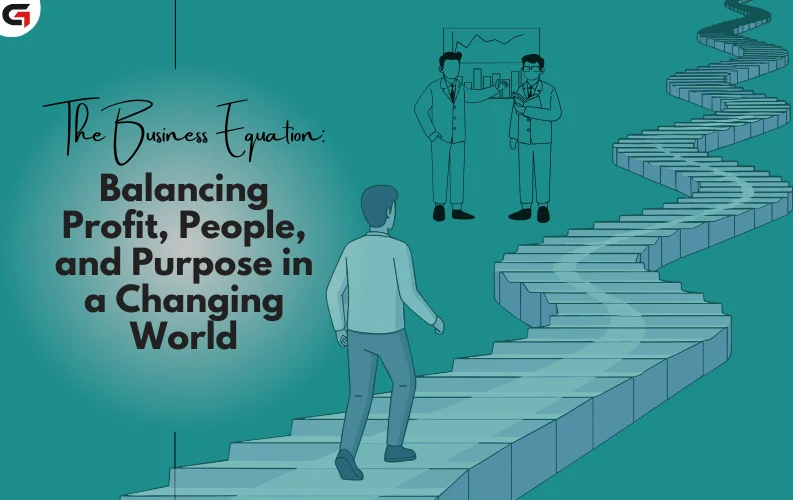In every generation, business leaders face a moment when the rules of success quietly change. For decades, profit was the ultimate scoreboard. If the numbers were strong, the business was considered healthy. But in the past few years, something has shifted. Employees are asking for meaning, consumers are demanding ethics, and investors want proof that a company stands for something more than quarterly gains.
This shift has given rise to a new equation, one that balances profit, people, and purpose. It’s not a corporate slogan; it’s a survival strategy. The most resilient organizations of our era have realized that financial performance, human well-being, and social value are now inseparable. Each strengthens the other.
Profit Still Matters, But It’s No Longer Everything
Let’s start with the obvious: no company can thrive without profit. Cash flow remains the language of sustainability. Yet the idea that profit alone defines greatness now feels outdated.
Today’s marketplace rewards responsibility as much as results. Investors are watching how a company earns its money, not just how much. Consumers notice when brands behave responsibly. And employees, especially the younger generations, prefer to work for organizations whose values mirror their own.
Think of how global brands have evolved. Apple built loyalty not only on product design but on its ability to inspire creativity and social change. Starbucks gained ground by linking its brand to community and inclusion. These companies still make money, a lot of it, but they’ve woven profit into a larger narrative about trust, innovation, and shared progress.
In short, profit has matured. It’s no longer the trophy; it’s the outcome of doing things right.
Also Read:- What Are Some Good Ideas for New Businesses?
People: The Beating Heart of Modern Enterprise
If profit keeps a business alive, people give it character. Decades ago, corporations were structured like machines, employees were the parts, expected to perform without question. That approach no longer works.
The new generation of workers seeks belonging, growth, and emotional safety. They want to be heard, not managed. Companies that understand this are rewriting what leadership means.
Google, for instance, built its empire on an idea simple yet radical at the time, trust people to think. The company encouraged employees to devote part of their week to projects that inspired them personally. That freedom led to world-changing ideas like Gmail and Google News.
The lesson? When people are valued beyond their job description, they return the favor with creativity and commitment.
This philosophy has taken hold everywhere, from small startups in Nairobi and Berlin to multinational giants in New York and Tokyo. The smartest leaders are learning that loyalty can’t be purchased; it has to be earned through authenticity, fairness, and purpose.
The Era of Purpose-Driven Business
If profit is the engine and people are the fuel, purpose is the map. It tells an organization where it’s going and why it matters. Without it, even a profitable company can lose direction.
Purpose answers the question, “Why do we exist beyond making money?” For some, it’s innovation; for others, sustainability or social improvement. The specifics differ, but the principle is the same: a clear sense of purpose aligns every decision, from product design to hiring to long-term investment.
A 2024 Deloitte survey found that purpose-driven organizations outperform competitors by almost 40 % in engagement and brand loyalty. That isn’t coincidence, it’s connection.
Consider Patagonia. When the company urged customers to “buy less” and repair existing gear, it defied conventional logic, yet sales rose because consumers trusted the intent. Or take Tesla, whose vision of accelerating the world’s transition to sustainable energy inspired an entire industry.
Purpose doesn’t dilute profit; it defines it. It turns commerce into contribution.
The Business Landscape in Flux
The modern economy is an unpredictable terrain. Markets shift overnight, supply chains falter, and new technologies redraw industry boundaries. In such an environment, balance is no luxury, it’s protection.
A company that obsesses over profit alone becomes fragile. One that focuses only on people may lose discipline. And an enterprise guided solely by purpose risks drifting into idealism without revenue to sustain it.
The art lies in equilibrium: earning ethically, leading compassionately, and operating with intent.
Let’s break down the global forces shaping this balance:
-
Technological Acceleration: Automation and AI are redefining what work means. Companies must combine efficiency with humanity.
-
Generational Power Shift: Millennials and Gen Z now dominate the workforce, and they expect integrity, flexibility, and inclusion.
-
Climate & Social Accountability: ESG metrics have become central to reputation and investment decisions.
-
Post-Pandemic Realities: Remote work, wellness, and resilience have permanently entered the corporate vocabulary.
These changes are not passing trends; they are structural.
Leadership in the Age of Balance
Modern leadership is no longer about authority; it’s about awareness. The world’s best CEOs have become storytellers, motivators, and cultural architects.
Satya Nadella’s transformation of Microsoft offers a clear example. When he took over, the company was profitable but stagnant. His first move wasn’t financial restructuring, it was empathy. He rebuilt Microsoft’s culture around curiosity and collaboration. The result? Renewed innovation, record valuations, and a workforce that believed again.
True leaders today:
-
Listen more than they speak.
-
Measure success in impact, not headlines.
-
Foster transparency even when it’s uncomfortable.
-
Encourage experimentation and accept intelligent failure.
They understand that leadership is no longer about being in charge, it’s about taking care of those in your charge.
When People and Purpose Strengthen Profit
Across continents, companies that prioritize people and purpose often outperform those that don’t. A few examples illustrate the point:
-
Unilever built a long-term strategy around sustainability. Its “Sustainable Living” brands grow faster than the rest of its portfolio.
-
Salesforce integrates philanthropy directly into its business model, dedicating time, equity, and product to social good, and remains one of the most profitable software firms globally.
-
LEGO invests in educational initiatives and renewable energy, turning family play into a platform for learning and responsibility.
Each of these giants discovered the same truth: when people feel valued and purpose is clear, profits follow naturally.
Related Article:- What Brilliant Business Ideas Do You Have for Now?
The Practical Equation: How to Keep the Balance
Balancing these three forces isn’t theory, it’s practice. Businesses that sustain this harmony tend to follow a pattern:
-
Define a Purpose You Can Live With
– Make it authentic, measurable, and woven into operations, not just marketing.
– Ask: “If our logo disappeared tomorrow, would our purpose still make sense?” -
Empower People Beyond Policy
– Encourage autonomy, reward ideas, and support well-being.
– Replace rigid hierarchies with cultures of trust and dialogue. -
Pursue Profits with Perspective
– Reinvest earnings into innovation, education, and sustainability.
– Build long-term relationships instead of chasing short-term wins.
When these elements work together, profit becomes more than a number, it becomes a reflection of health, reputation, and humanity.
Lessons from Failure
Not every company gets it right. Some fall into the trap of “purpose-washing”, advertising values they don’t live by. Others treat employees as family only until financial trouble hits.
The backlash is often swift. Scandals tied to worker exploitation, data misuse, or environmental damage can erase decades of goodwill in weeks. The modern audience forgives mistakes but not hypocrisy. Authenticity has become the new currency of trust.
The lesson? Don’t declare balance; demonstrate it.
A Global Conversation About Value
The global conversation around business is becoming more philosophical. Nations debate fair taxation, equitable trade, and corporate responsibility. Consumers wield more influence than ever through social media. Governments reward transparency. Investors are beginning to judge companies not only by return but by relevance.
It’s an extraordinary evolution: capitalism is learning empathy.
Yet this new equation doesn’t ask leaders to abandon ambition, only to expand it. A profitable company that uplifts communities and protects the planet doesn’t dilute capitalism; it completes it.
Redefining What We Measure
As this philosophy spreads, the metrics of success are changing. Beyond traditional KPIs, companies now track:
-
Employee engagement and retention.
-
Social and environmental impact.
-
Customer trust and satisfaction.
-
Contribution to innovation and education.
Financial statements will always matter, but the story behind those numbers will matter even more.
Challenges Ahead
Maintaining this balance isn’t easy. Short-term investor expectations can clash with long-term purpose. Political uncertainty can disrupt ESG goals. And building a culture of empathy takes time in organizations accustomed to control.
But the payoff is immense. Balanced companies weather crises better, attract stronger talent, and enjoy customer loyalty that advertising can’t buy.
The Future Belongs to the Balanced
Business has entered a more human century. Success now demands conscience as much as competence. The firms that thrive in this age will be those that understand a simple but profound truth: profit sustains the body of business, people sustain its heart, and purpose sustains its soul.
In the years to come, as economies transform and technologies evolve, this trio, profit, people, and purpose, will remain the unshakable foundation of meaningful enterprise. Those who master the balance will not just lead markets; they’ll lead movements.
You may also like:-





















